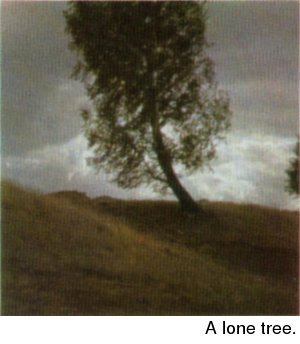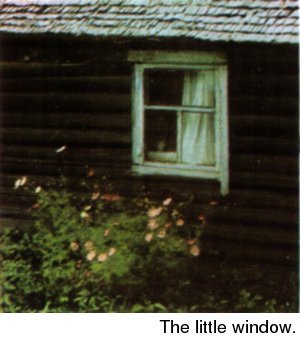It was a dark February night in 1933. Two black shapes could be seen by a stack in the cold and cheerless snow-covered field. The two figures would sit down to hide from the icy wind for a while and then start walking up and down briskly, stamping their feet. The two people were guarding the collective farm's potatoes which had been buried in deep pits in the fall. They had to be guarded, for it was a hungry time and there was thieving, since the rich kulaks could not afford to let the new collective farm prosper. One of the pits had been broken into the week before. Though the potatoes had not been stolen, they had been tossed onto the frozen ground and so would be no good for planting in spring.
The cold night dragged on. The two people wished they could put down their shotguns and crawl into the stack, where it was not so cold. Their lids were heavy, but they could not fall asleep, for they had volunteered for the job.
A horse snorted.
"Who's there?"
Three men in sheepskin coats were busy digging.
The two watchmen fired into the air as a warning. Then they fired again. A struggle followed, but it was not two against three, for one of the two had turned tail and run, sinking up to hiswaist in the snow. A man who had volunteered to guard the farm's potatoes had run off, leaving his comrade alone. Two of the bandits dropped their guns and grabbed a pick from their sleigh.
"That takes care of him," one of them said hoarsely.

The three men then jumped into their sleigh. They had not been able to uncover the potato pit, but they had left a battered body by the stack.
The bandits thought they had killed the watchman. However, he came to his senses and began crawling towards the village, leaving a bloody trail in the snow. Farmers were running towards him.
"Follow them! I shot at their sleigh. The buckshot will tell you whose it is," Antonikha said and passed out.
The bandits were apprehended. The scars on Antonikha's head and several broken ribs were a reminder of that night.
"She's got nine lives!" one of the bandits muttered in the courtroom as he glared at her.
In 1942 the front line was moving across the Don, a veritable avalanche of fire and flame. All that remained of the village on the hill was a cluster of brick chimneys. Those who had not managed to-escape across the river were hiding in their cellars. They dared not venture out, for the sky had come crashing down upon the steppe and it seemed that the very earth was ablaze. Then the thunder died down and German soldiers in green uniforms appeared on the hill.
That night someone knocked softly on the cellar door of the last house by the river. A young Soviet lieutenant climbed down. His flashlight illumined his bandages and sooty face. "I'm looking for Antonikha," he said. "There are sixty of us. We were covering our troops. We've got to get across the Don. They said you're the only one who can help us."
The beam of the nazi searchlight grazed the tips of the cattails and slipped over the dark, uneasy water but could not reach the area directly under the steep bank. Sixty exhausted, wounded soldiers huddled there, waiting to be ferried across. All the boats had been wrecked. Only Antonikha's had survived, hidden as it was among the reeds.
"I'll take the ammunition and motorcycle over on the first trip," the young lieutenant said.
The searchlight picked out the boat as it reached the middle of the river. The two rowers became confused. The boat tilted and turned over. The soldier and the lieutenant swam back to the bank, but they had lost their motorcycle and ammunition.
"Anastasiya Antonovna will ferry you across," the lieutenant said to his men as he wrung out his wet shirt. "The badly wounded go first."
Antonikha rowed back and forth across the river until dawn.
By 1944 the war had receded from the village. One day a car drove up. A dusty, bemedalled major got out. He asked where he could find "the boatwoman Antonikha." But she was not at home and he was in a great hurry. He left her neighbours a sack of flour, sugar, eight pounds of butter, army rations, a bolt of parachute silk and a note: "For Antonikha, with gratitude from her friend, the lieutenant. Pm sorry you were not at home. I'm sure we'll meet again."
Perhaps the major did not live to see the end of the war. Then again, perhaps he is alive and still recalls crossing the Don that June night in 1942.
In 1946 Antonikha pulled an object that was either a gun-bolt or a machine part up in her net.
"What if I raise the motorcycle?" she wondered, for she remembered the exact place the boat had overturned.
Antonikha weighted her net with bricks to make it drag along the bottom. It caught on something on the third try. She dropped a stone in the spot and followed the rope into the water. It was the motorcycle!
Borrowing a cable from the local tractor repair shop, she set up a winch on the bank, then spent the day gently rocking the sand-covered motorcycle back and forth so as not to damage it further. At last she pulled it out. There were green water plants in the cab, but the cartridges and machine-gun discs seemed practically new. The entire village came running to have a look at her find.
No one saw Antonikha near the river for the next two months. She was busy taking the motorcycle apart, oiling it, assembling and dismantling it again, for it had been under water for four years. It is difficult to say how she guessed what to do. At any rate, towards the end of the summer she zoomed through the village, scaring the chickens and delighting the children, and then spent the day riding around the meadow, getting to know the ways of her iron horse, as she came to call the motorcycle.

There are any number of motorcycles in the village today. They are new and of various makes. Antonikha's cumbersome wartime IZH does a yeoman's job, carting bundles of hay and wood and baskets of mushrooms, wild pears and fish to the house. It is a weird vehicle, with wires and soldered patches all over it. A large tractor part has been fitted to it. Strangely, the contraption is in running order! On rare occasions the village children give the old woman a hand in pushing it up the hill.
"My horse gives me a lot of trouble," she said with a smile, "but I can't bear to part with it. I like a fast ride. Besides, my legs aren't what they used to be. It's a long walk to the woods, and this beast gets me there in no time."
When I was ready to leave I asked Antonikha to give me a lift to the pier.
I can honestly say that I never met a more confident driver. However, when we were within sight of the river the old work-horse began to cough and sputter. Something had gone awry in its battered insides.
"Never mind, I'll see what's wrong" she said.
Antonikha pulled off her padded jacket, rolled up her sleeves like an old pro and spread a cloth on the ground, placing the greasy bits of machinery on it with great care. All this was accompanied by good-natured grumbling and a few cutting remarks addressed to one Vanya Korovin.
"That was some favor he did me, the s.o.b. He sure fixed it."
I was fascinated by the way Antonikha blew hard into a small piece of metal and then held it up to the light. Spotting a truck coming towards us, she raised her hand.
"Take this man to the pier, Stepan, and come back and give me a hand," she said.
The driver quickly opened the cab door. I said goodbye to her, wrote down her address and took her picture. Antonikha glanced at her watch.
"You'd better hurry. The boat won't wait for you."
As I stood on the deck of the river boat I gazed at the road leading to the pier. Would I see Antonikha again? When the boat turned and headed off, a motorcycle finally appeared in the distance. Antonikha rode along the bank, overtook us and stopped on the hill, a solemn and dignified figure.
